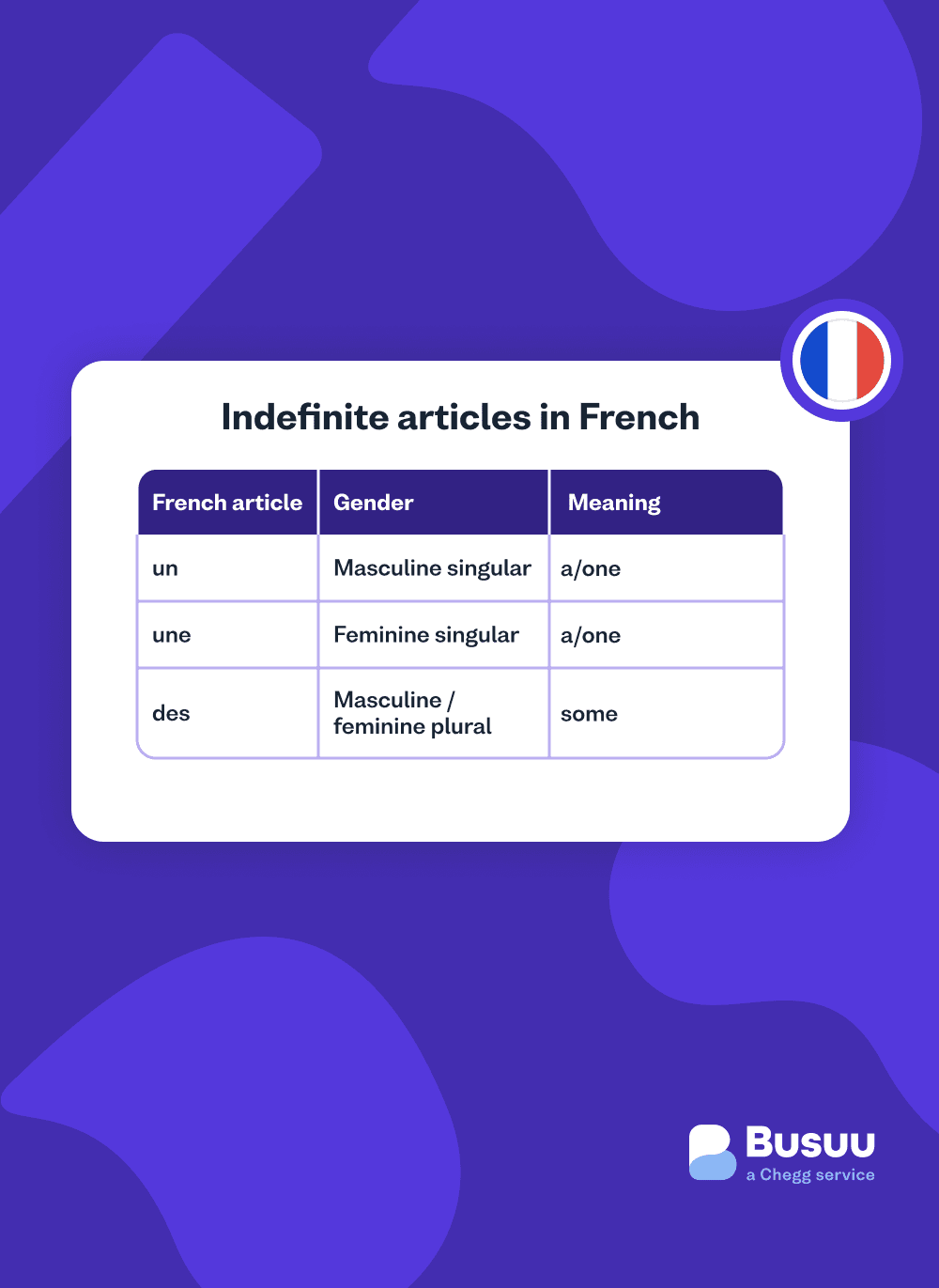I want to learn...
Indefinite articles in French or l’article indéfini are used to denote the corresponding English articles “a”, “an”, and “some”. French indefinite articles are used to talk about an unspecified person or thing. They are also used to talk about just one of something.
French articles are gendered because there is almost always a noun following them that is gendered. Along with having to agree with the gender, the articles also must agree with the number of the noun that they modify.
Let’s dig deeper and learn more about the three indefinite articles in French.
.
Indefinite articles in French
There are three indefinite articles: un, une, and des. Un is used for masculine singular nouns, une is used for feminine singular nouns, and des is used for masculine and feminine plural nouns.

Indefinite articles in French
| Article | Gender | Meaning |
|---|---|---|
| un | Masculine singular | a/one |
| une | Feminine singular | a/one |
| des | Masculine/feminine plural | some |
Masculine indefinite articles
Let’s take a look at some examples of masculine indefinite articles:
un jour (a day)
un animal (an animal)
un mari (a husband)
Feminine indefinite articles
Now let’s take a look at some examples of feminine indefinite articles:
une heure (an hour)
une mer (a sea)
une fille (a daughter)
Plural indefinite articles
Finally, we look at some examples of plural indefinite articles:
des jours (days)
des animaux (animals)
des heures (hours)
Note: The plural indefinite article des, is the same regardless of the gender of the noun that it precedes. In other words, des is used with both the masculine plural and the feminine plural.
Where to use indefinite articles
Below we discuss where you should remember to use indefinite articles. They are used to refer to unspecific nouns, or nouns that you do not really know anything about. In French, there are specific rules you should follow when you want to use l’article indéfini.
1. Indefinite articles when speaking about general nouns
Indefinite articles are used with nouns that are not clearly defined by the speaker. The nouns these articles define are typically countable nouns.
For example:
J'ai vu un oiseau dans un arbre aujourd'hui. (I saw a bird in a tree today.)
Il y a des couvertures dans son placard. (There are some blankets in his closet.)
Now that you’re learning French indefinite article rules, let’s take a break and learn some lighthearted French. Here are 8 funny French phrases you need to know.
Indefinite articles are also used after verbs that express possession or consumption.
For example:
Je voudrais un café s'il vous plait. (I would like a coffee, if you please.)
J'ai une petite voiture argentée. (I have a small silver car.)
2. Before every noun in a list
Unlike in English, you need to add an article before every noun in a list.
For example:
J'ai un stylo bleu, une gomme et un crayon dans mon sac. (I have a blue pen, an eraser, and a pencil in my bag.)
In English, this sentence would be written as “I have a blue pen, eraser, and pencil in my bag.” In French, as you can see, the three nouns (stylo, gomme, and crayon) has an article in front of it. These articles, namely the two articles un and une correspond to the gender and quantity of the noun following them.
Exceptions to the use of indefinite articles
There are a few exceptions to using indefinite articles in French. Let’s have a look at those right now! Knowing these will level up your skills and you will sound like a native speaker.
1. Negative sentences
First, let’s look at negative sentences. In negative sentences in French, the articles un, une, and des become de or d’.
Indefinite articles in negative sentences in French
| Article | Gender | Negative |
|---|---|---|
| un | Gender | Negative |
| un | Masculine singular | pas de/d’ |
| une | Feminine singular | pas de/d’ |
| des | Masculine/feminine plural | pas de/d’ |
Check out these examples:
J'ai un stylo bleu mais pas de rouge. (I have a blue pen but not a red one.)
Je n'ai pas de voiture. (I don’t have a car.)
Il n'a pas d'oeufs. (He doesn’t have eggs.)
2. Profession or religion
When talking about a profession or religion, unlike in English, you do not use an indefinite article in French.
For example:
Mon cousin est médecin. (My cousin is a doctor.)
Elle est hindoue. (She is Hindu.)
As you can see in the above sentences, the indefinite article is completely absent.
Learn even more rules below. But in addition to these grammar rules, why does culture matter if all you want to do is speak French?
3. To express quantity
When you want to express quantity, you need to remove the indefinite article and replace it with de or d’.
For example:
Elle a tant de fleurs. (She has so many flowers.)
4. When an adjective precedes the noun (plural)
When there is an adjective that precedes the noun, the plural indefinite article takes the form de. It remains a plural indefinite article.
For example:
Je veux de nouveaux stylos. (I want some new pens.)
Elle possède de grands parapluies violets. (She possesses/has big purple umbrellas.)
Wrapping up
To recap, there are only three indefinite articles (un, une, and des) in French, and as long as you know the gender and quantity of the noun, it is easy to remember which one to place in the sentences you make.
But remember that there are some scenarios in which the article indefini is not used or the article indefini becomes de or d’.
Newlanguages


